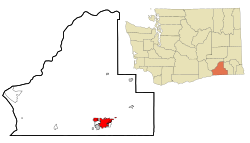Walla Walla (Washington)
| Walla Walla | |
|---|---|
 |
|
| Location in county and state | |
| Basic data | |
| Foundation : | 1856 |
| State : | United States |
| State : | Washington |
| County : | Walla Walla County |
| Coordinates : | 46 ° 4 ′ N , 118 ° 20 ′ W |
| Time zone : | Pacific ( UTC − 8 / −7 ) |
|
Inhabitants : - Metropolitan Area : |
31,731 (as of 2010) 64,278 (as of 2016) |
| Population density : | 1,133.3 inhabitants per km 2 |
| Area : | 28.1 km 2 (approx. 11 mi 2 ) of which 28.0 km 2 (approx. 11 mi 2 ) are land |
| Height : | 287 m |
| Postal code : | 99362 |
| Area code : | +1 509 |
| FIPS : | 53-75775 |
| GNIS ID : | 1512769 |
| Website : | www.ci.walla-walla.wa.us |
| Mayor : | Dan Johnson |
 Walla Walla climate diagram |
|
Walla Walla is a city in the southeast of the US state Washington , on the northwest slope of the Blue Mountains , not far from the border with Oregon . At the time of the 2010 United States Census , there were 31,731 people in the city. Walla Walla is the capital of the county of the same name .
history
The city emerged from the missionary station of the American doctor and missionary Marcus Whitman and his wife Narcissa, who settled on the Walla Walla River in 1836 to convert the Nez Percé and Cayuse Indians . The station was on the route that trappers and fur traders of the British Hudson's Bay Company (HBC) used from the upper reaches of the Snake River to their trading posts on the Columbia River . The area belonged to the Oregon Country and was outside the United States , whose western border was then still the main ridge of the Rocky Mountains , but the London Treaty of 1818 gave the Americans the right to use the region on an equal footing with the British.
More and more pioneers and settlers came over the Rocky Mountains via the fur traders route. In 1842, Marcus Whitman went east and, in the summer of 1843, brought the first organized settlers' trek across the mountains to Oregon on what was soon to be known as the Oregon Trail . In 1847, the Cayuse attacked the mission station in the Whitman massacre , killing Whitman, his wife and eleven other people after not only an increasing number of settlers invaded their areas, but also an outbreak of cholera brought along by the whites had hit the people hard. HBC's Peter Skene Ogden came from Fort Nez Percés, about 50 km away on the Columbia River, and successfully negotiated the release of 54 women and children held prisoner.
The massacre had a decisive influence on the negotiations of the Oregon Compromise , through which the United States was extended to the southern part of Oregon, the Oregon Territory . In 1848, in retaliation, the Territory's Provisional Government and the US Army began the Cayuse War , which lasted until 1855. In 1853 the territory was divided so that Walla Walla was now part of the Washington Territory . The mission station was continued and in 1858 the army base Fort Walla Walla was added. As a result of a gold rush in the 1860s, the place grew to become the largest settlement in the Washington Territory.
The Catholic diocese Walla Walla was also settled in Walla Walla in 1846 , but was given up again in 1853 in favor of the diocese of Nesqually . In the years that followed, agriculture became the most important branch of the economy, and the cultivation of wheat , onions and grapes is still of economic importance today .
Today, both viticulture and wine processing make up a large part of the local businesses. Walla Walla currently has more than 100 wineries and oenological businesses, some of which have come together in the Walla Walla Vintners association and are thus organized as a kind of cooperative .
Population development
| year | Residents¹ |
|---|---|
| 1980 | 25,618 |
| 1990 | 26,478 |
| 2000 | 29,686 |
| 2010 | 31,731 |
¹ 1980-2010 : census results
Facilities and miscellaneous

The Whitman College , founded in 1859 and named after the town's founding couple, is located in Walla Walla . Walla Walla University is located in the neighboring town of College Place . Walla Walla is also home to the largest prison in Washington state. Until its abolition in 2018, the executions as part of the Washington State sentencing to the death penalty also took place there.
Walla Walla has been twinned with Sasayama in Japan since 1972 .
sons and daughters of the town
- Marion Bauer (1882–1955), composer
- Jonathan M. Wainwright (1883–1953), military officer and general in the American Army
- Robert N. Bradbury (1886–1949), film director, screenwriter and film producer
- Wallace Reed Brode (1900–1974), chemist and science organizer
- Kenneth Rush (1910–1994), business manager and diplomat
- Ralph Boas (1912–1992), mathematician
- Ferris Webster (1912-1989), film editor
- Nesmith Ankeny (1927-1993), mathematician
- Adam West (1928-2017), actor
- Curtis OB Curtis-Smith (1941-2014), composer
- Walt Minnick (* 1942), politician
- Denney Goodhew (* 1952), jazz musician
- Hamza Yusuf (* 1958), Islamic theologian
- Brad Shepik (* 1966), jazz musician
- Connor Trinneer (* 1969), actor
- Thomas Kelati (* 1982), Polish basketball player
- Will Brandenburg (* 1987), ski racer
Web links
- The City website ( English )
- Entry in the Washington encyclopedia HistoryLink (English)
